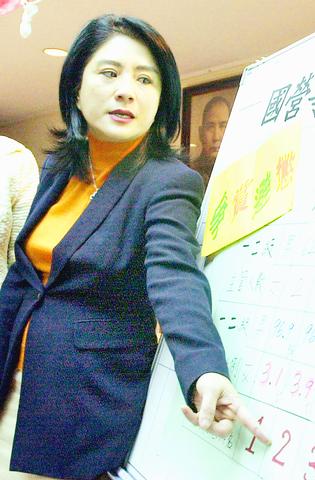The DPP Central Review Com-mittee yesterday decided to expel Legislator-at-large Chiu Chang (邱彰) from the party for allegedly spoiling her ballot in the legislative vice-speakership race on Feb. 1.
The party alleges that Chiu refused to show her ballot during the election, breaking a party resolution that required members to show how they voted. Chiu's refusal cast doubt on whether she had voted for the DPP candidate.

TAIPEI TIMES FILE PHOTO
In response to the committee's decision, Chiu's voting witness Wang Sing-nan (王幸男), also a DPP lawmaker, said the decision was based on personal feuds within the party and reiterated that Chiu really did vote for the party's candidate, Hong Chi-chang (洪奇昌).
Chiu was quoted by the Central News Agency as vowing to appeal the decision to the party's Arbitration Committee.
But Chiu told the Taipei Times yesterday that she would respond to the decision in a press conference scheduled for this morning.
The Central Review Committee's ten members met yesterday for a second time to discuss disciplinary measures for Chiu.
Among the three actions the party could have taken -- warning, suspending party membership and expulsion from the party -- eight out of the 10 members voted to oust her.
The eight members who voted to expel Chiu were Lee Chun-yee (
KMT candidate Chiang Ping-kun (江丙坤) won the Feb. 1 election for vice speaker over DPP candidate Hong by nine votes in a second round of voting after neither secured a majority in the initial round.
Three of the four invalid ballots from the first round are suspected to have been spoiled by DPP lawmakers. But the DPP has never been able to prove that Chiu really spoiled her ballot.
Chiu was accused during the last legislative session by former party caucus whips of violating party discipline by refusing to show her ballot to the DPP's voting witness and also for shouting on the legislative floor.
Although the party has no proof Chiu spoiled her ballot, the committee's decision was nevertheless applauded by former legislative whip Tsai Huang-liang (蔡煌瑯).
"Since she refused to show her ballot to the party's witness and there were four spoiled ballots, we have reason to suspect that she cast an invalid vote by deliberately spoiling her ballot. As every faction of the party has its representative present in the committee, how can anyone suggest the decision was based on electoral feuding? If everyone behaved like her, how would you expect the party to impose discipline on its members?" Tsai said.
If Chiu fails in an appeal, her legislator-at-large seat would be filled by former lawmaker Lin Wen-lang (

An essay competition jointly organized by a local writing society and a publisher affiliated with the Chinese Communist Party (CCP) might have contravened the Act Governing Relations Between the People of the Taiwan Area and the Mainland Area (臺灣地區與大陸地區人民關係條例), the Mainland Affairs Council (MAC) said on Thursday. “In this case, the partner organization is clearly an agency under the CCP’s Fujian Provincial Committee,” MAC Deputy Minister and spokesperson Liang Wen-chieh (梁文傑) said at a news briefing in Taipei. “It also involves bringing Taiwanese students to China with all-expenses-paid arrangements to attend award ceremonies and camps,” Liang said. Those two “characteristics” are typically sufficient

A magnitude 5.9 earthquake that struck about 33km off the coast of Hualien City was the "main shock" in a series of quakes in the area, with aftershocks expected over the next three days, the Central Weather Administration (CWA) said yesterday. Prior to the magnitude 5.9 quake shaking most of Taiwan at 6:53pm yesterday, six other earthquakes stronger than a magnitude of 4, starting with a magnitude 5.5 quake at 6:09pm, occurred in the area. CWA Seismological Center Director Wu Chien-fu (吳健富) confirmed that the quakes were all part of the same series and that the magnitude 5.5 temblor was

The brilliant blue waters, thick foliage and bucolic atmosphere on this seemingly idyllic archipelago deep in the Pacific Ocean belie the key role it now plays in a titanic geopolitical struggle. Palau is again on the front line as China, and the US and its allies prepare their forces in an intensifying contest for control over the Asia-Pacific region. The democratic nation of just 17,000 people hosts US-controlled airstrips and soon-to-be-completed radar installations that the US military describes as “critical” to monitoring vast swathes of water and airspace. It is also a key piece of the second island chain, a string of

The Central Weather Administration has issued a heat alert for southeastern Taiwan, warning of temperatures as high as 36°C today, while alerting some coastal areas of strong winds later in the day. Kaohsiung’s Neimen District (內門) and Pingtung County’s Neipu Township (內埔) are under an orange heat alert, which warns of temperatures as high as 36°C for three consecutive days, the CWA said, citing southwest winds. The heat would also extend to Tainan’s Nansi (楠西) and Yujing (玉井) districts, as well as Pingtung’s Gaoshu (高樹), Yanpu (鹽埔) and Majia (瑪家) townships, it said, forecasting highs of up to 36°C in those areas